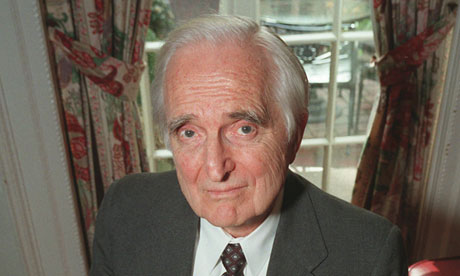
Doug Engelbart in
1997. The inventor of the computer mouse – who said his work was all
about 'augmenting human intellect' – has died. Photograph: Michael
Schmelling/AP
The Computer History Museum in Mountain View, California, where Engelbart had been a fellow since 2005, said on Wednesday that it was notified of the death in an email from his daughter and biographer, Christina.
Back in the 1950s and 60s, when mainframes took up entire rooms and were fed data on punch cards, Engelbart already was envisioning a day when computers would empower people to share ideas and solve problems in ways that seemed unfathomable at the time.
He said his work was all about "augmenting human intellect" – a mission that boiled down to making computers more intuitive to use. One of the biggest advances was the mouse, which he developed in the 1960s and patented in 1970. At the time, it was a wooden shell covering two metal wheels: an "X-Y position indicator for a display system."
Engelbart "brought tremendous value to society", said Curtis R Carlson, the CEO of SRI International. "We will miss his genius, warmth and charm. Doug's legacy is immense. Anyone in the world who uses a mouse or enjoys the productive benefits of a personal computer is indebted to him."
The notion of operating the inside of a computer with a tool on the outside was way ahead of its time when Engelbart began working on it. The mouse did not become commercially available until 1984, with the release of Apple's then-revolutionary Macintosh, a precursor to future breakthroughs such as the iPhone and iPad.
Engelbart conceived the computer mouse so early in the evolution of computers that he and his colleagues didn't profit much from it. The mouse patent had a 17-year life span, allowing the technology to pass into the public domain in 1987. That prevented Engelbart from collecting royalties on the mouse when it was in its widest use. At least a billion have been sold since the mid-1980s.
Although computer mice remain prevalent, their usage is waning as people increasingly control smartphones and tablets in an even simpler way: by swiping their finger across a display screen.
Among Engelbart's other key developments in computingcomputing along with his colleagues at the Stanford Research Institute and his own lab, the Augmentation Research Centre, was the use of multiple windows. Engelbart's lab also helped develop ARPANet, the government research network that led to the internet.
In a precursor to the dramatic presentations that Apple founder Steve Jobs became famous for, Engelbart dazzled the industry at a San Francisco computer conference in 1968. Working from his house with a homemade modem, he used his lab's elaborate new online system to illustrate his ideas to the audience, while his staff linked in from the lab. It was the first public demonstration of the mouse and video teleconferencing, and it prompted a standing ovation.
"Doug pioneered network computing technologies when it was not popular to do so," Sun Microsystems' then-CEO, Scott McNealy, said in 1997.
Even so, the mild-mannered Engelbart gave deference to his colleagues and played down the importance of his inventions, stressing instead his bigger vision of using collaboration over computers to solve the world's problems.
"Many of those firsts came right out of the staff's innovations – even had to be explained to me before I could understand them," he said in a biography written by his daughter. "They deserve more recognition."
In 1997, Engelbart won the most lucrative award for American inventors, the $500,000 Lemelson-MIT prize. Three years later, President Bill Clinton bestowed Engelbart with the National Medal of Technology "for creating the foundations of personal computing".
Douglas Carl Engelbart was born 30 January 1925 and grew up on a small farm near Portland, Oregon. He studied electrical engineering at Oregon State University, taking two years off during the second world war to serve as a Navy electronics and radar technician in the Philippines.
It was there that he read Vannevar Bush's As We May Think in a Red Cross library and was inspired by Bush's idea of a machine that would aid human cognition.
After the war, Engelbart worked as an electrical engineer for Nasa's predecessor, NACA, at its Ames Laboratory. Restless, and dreaming of computers that could change the world, Engelbart left Ames to pursue his PhD at University of California, Berkeley.
He earned his degree in 1955. But after joining the faculty, Engelbart was warned by a colleague that if he kept talking about his "wild ideas" he would be an acting assistant professor forever. So he left for the research position at Stanford Research Institute, now SRI International.
In 1990, Engelbart started the Bootstrap Institute, which researches ways to advance collaboration on complex problems.CHANZO GUARDIAN UK







No comments:
Post a Comment